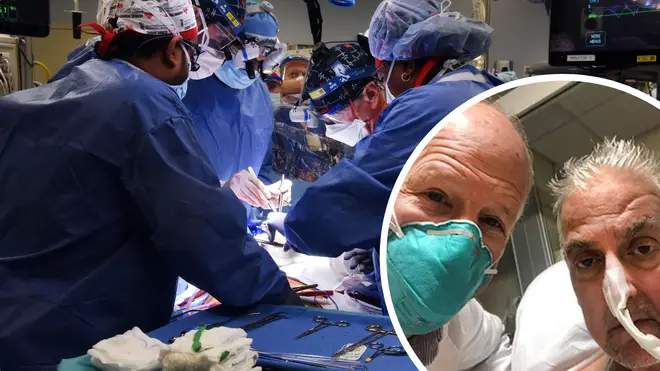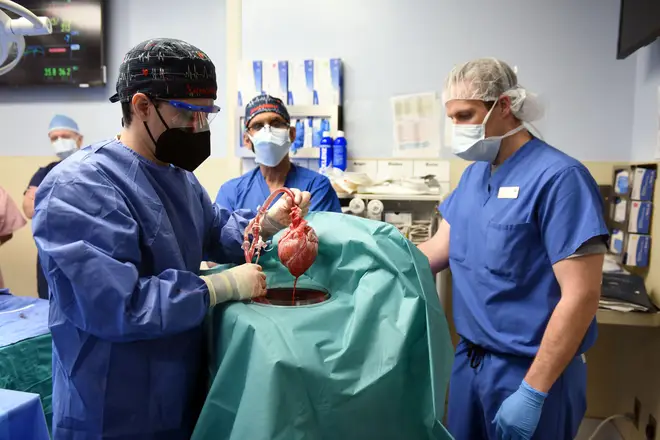
Nick Abbot 12am - 1am
11 January 2022, 12:45

Doctors in the US have transplanted a pig's heart into a dying man in a last-ditch effort to save his life.
The genetically-modified heart was transplanted into 57-year-old David Bennett, who was ineligible for a human heart transplant and had no other option.
The seven-hour procedure was a medical first, marking a significant step in the decades-long quest to one day use animal organs for life-saving transplants.
Read more: PM confirms self-isolation could be cut but insists he is 'following the science'
Read more: Downing St drinks: Rule-breaking 'rife' at heart of No10, Labour MP fumes
Whilst there is no guarantee the heart will work - something the patient is aware of - he is doing well three days after the highly experimental surgery at Baltimore Hospital.
"It was either die or do this transplant," said Mr Bennett the day before the surgery, according to a statement provided by the University of Maryland School of Medicine.
"I want to live.
"I know it's a shot in the dark, but it's my last choice."

Doctors at the University of Maryland Medical Centre say the transplant showed that a heart from a genetically modified animal can function in the human body without immediate rejection.
"If this works, there will be an endless supply of these organs for patients who are suffering," said Dr Muhammad Mohiuddin, scientific director of the university's animal-to-human transplant programme.
There is a huge shortage of human organs donated for transplant, driving scientists to try to figure out how to use animal organs instead.
Last year, there were just over 3,800 heart transplants in the US - a record number, according to the United Network for Organ Sharing, which oversees the nation's transplant system.
Read more: Ed Miliband: Boris Johnson needs to justify No 10 parties, he can't hide behind inquiry
Read more: Armed police stand-off with father who has son, 8, in house rumbles into third day
But prior attempts at such transplants - or xenotransplantation - have failed, largely because patients' bodies rapidly rejected the animal organ.
The difference this time: surgeons used a heart from a pig that had undergone gene-editing to remove a sugar in its cells that is responsible for that hyper-fast organ rejection.

"I think you can characterise it as a watershed event," said Dr David Klassen, UNOS' chief medical officer.
But he cautioned that it is only a first tentative step into exploring whether this time around, xenotransplantation might finally work.
The Food and Drug Administration, which oversees xenotransplantation experiments, allowed the surgery under what is called a "compassionate use" emergency authorisation, available when a patient with a life-threatening condition has no other options.
Read more: Hug your pet and do star jumps to keep warm as gas bills soar says energy firm
Read more: LBC buys deadly 21-inch blade to expose loophole in 'pointless' zombie knife law
Just last September, researchers in New York performed an experiment suggesting these kinds of pigs might offer promise for animal-to-human transplants.
Doctors temporarily attached a pig's kidney to a deceased human body and watched it begin to work.
The Maryland transplant takes their experiment to the next level, said Dr Robert Montgomery, who led that experiment at NYU Langone Health.
"This is a truly remarkable breakthrough," he said in a statement.
"As a heart transplant recipient, myself with a genetic heart disorder, I am thrilled by this news and the hope it gives to my family and other patients who will eventually be saved by this breakthrough."